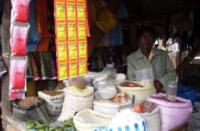
Feature Story
New wave of cooperatives in Cameroon help HIV-positive women gain economic independence
25 February 2010
25 February 2010 25 February 2010
Honorine B has opened her own successful business as a result of the ILO/SIDA cooperative project.
Credit: ILO
Many people living with HIV face not only health issues but may also struggle to make ends meet economically. A number of HIV-positive women in north west Cameroon are taking the initiative by generating income through cooperatives, with the assistance of the International Labour Organization (ILO) funded by the Swedish International Development Cooperation Agency (Sida).
Cooperatives (coops) have historically provided much needed support for the disadvantaged, but people living with HIV have been marginalised or ignored, with coops sometimes refusing to disburse grants in the belief that investing in them would not see worthwhile returns. This project, set up last year, aims to change that.
The project aims that women gain more financial independence and generally enhance the quality of their lives. So far it has helped more than 100 women to operate in a broad range of areas including commerce, tailoring, designing, rearing pigs and poultry, secretarial support and communication services.
This is a large and notable project. A great deal of progress has been made and it has certainly had an impact at local level and reflects and responds to issues on the ground.
Dr Mamadou L Sakho, UNAIDS Country Coordinator for Cameroon
A revolving micro-credit fund scheme was set up in three micro-finance institutions across the North-west Region in Bamenda, Kumbo and Wum.
A number of safeguards were put in place by the ILO and its partners to try to ensure the project’s success. Support structures, called ‘Centres of Competence’ were provided by the CoopAfrica organization. These centres offered skills and resources for cooperative members to prosper and grow, pool resources and become increasingly empowered.
As well as funding grants for the micro-projects, assistance included training managers and psycho social and economic counsellors from the targeted micro-finance institutions to support beneficiaries. The training package contained business development, management procedures, AIDS support, counselling and stigma reduction components.
Capacity-building workshops were also held for HIV-positive women from the targeted communities on various aspects of running a business. Following the assessment of 192 micro-projects submitted after the training, 68 received seed funding and all of the beneficiaries are now running their own businesses.
Cheaka Toure from the ILO sub-regional office for central Africa believes that through this project both people living with HIV and their communities benefit. He notes that not only do resources go directly to those who are HIV-positive but they become key participants in the local AIDS response. “The project addresses HIV issues in a comprehensive and integrated way, combining behaviour change and care with economic empowerment of people living with HIV who are now main actors in their own destiny and can take care of themselves economically.”
Evodia A, one of the beneficiaries, has seen her life turned around. “I rear pigs. Before the project I had a single pig and with the funds that I got, I now have six. I have even set up a garden which is being fertilised with material from the piggery and now I harvest vegetables from the garden for my nutrition.”
A key knock-on effect of the relative success of the project is a greater self-confidence and hope among the women. Many others living with HIV have also expressed their willingness to become involved in the scheme.
Dameni Oussematou from Integrated Development Foundation, an ILO partner, has noticed this newfound self-confidence. “I am impressed by the rapid change the coop members are demonstrating. They are now business oriented…. and proud to show it. The saving habit is gaining ground; the repayment rate is 98% in two of the three cooperatives”. He adds, “And men living with HIV have expressed a strong willingness to be targeted by this intervention too”.
Dr Mamadou L Sakho, the UNAIDS Country Coordinator for Cameroon, shares this enthusiasm for the cooperatives. “This is a large and notable project. A great deal of progress has been made and it has certainly had an impact at local level and reflects and responds to issues on the ground. It would be welcome to see knowledge about the intervention reach a wider audience now.”
There have been numerous lessons learned. For instance, the capacity of the beneficiaries needs to be further built, given their heavy reliance on frequent visits from cooperative institutions to monitor their businesses and provide guidance. Identifying a greater number of activities with high income potential for the future is also suggested.
It is clear that the HIV-positive women taking part in the project have increased business acumen and insight which bodes well for their greater economic independence. A number have said that they now keep financial records for the first time and are better able to track the growth of their businesses. According to Honorine B, she has never looked back: “Before the project I bought my selling items in small quantities. I have increased my stock because of the project. I have opened a business place and have added plantains and cocoyam… I heartily thank the project.”



